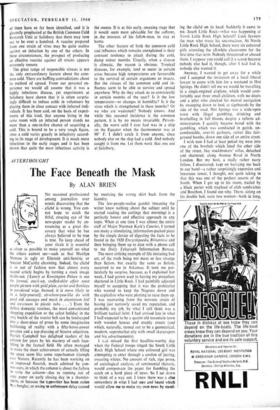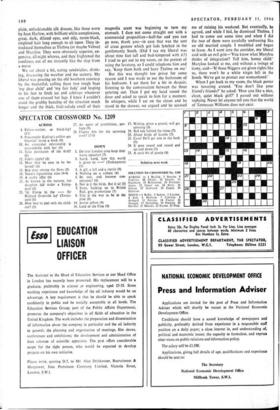AFTERTHOUGHT
The Face Beneath the Mask
By ALAN BRIEN
No seasoned professional among journalists ever minds discovering that the cliché is wrong. You can- not hope to catch the fitful, straying eye of the newspaper reader by an- nouncing as a great dis- covery that what he has always believed to be true is true. To keep ahead of your rivals it is essential as often as possible to make yourself see what the others cannot see—such as that Marilyn Monroe is ugly or Einstein anti-Semitic or Senator McCarthy charming. Indeed, the cliché is so out of fashion now that almost every second article begins by turning a stock image inside-out. (`Lunch at Kensington Palace is not the formal, stuck-up, stuffed-shirt affair most people picture with gold plate, caviar and flunkeys in powdered wigs. Instead, it is more likely to be a help-yourself, sit-where-you-like do with good old sausages and mash in aluminium foil and ice-cream in plastic tubs. . . .) Even the dullest domestic routines, _the most conventional shopping expedition or the safest holiday in the very buckle of the tourist belt can be landscaped into a show-piece of prose by some imaginative bulldozing of reality with a fifty-horse-power paradox and a top dressing of bizarre adjectives. Patrick Campbell has delighted readers of his column for years by his mastery of such face- lifting in the factual field. He often managed to make the sheer achievement of actually filling the space seem like some superhuman triumph over Nature. Recently he has been working on an improved flourish, much admired by con- noisseurs, in which the column is about the failure to Write the column—due to running out of copy paper on early closing day in a thunder- storm, or because the typewriter has been stolen by a burglar, or owing to unforeseen delay caused by receiving the wrong shirt back from the laundry.
The few-people-realise gambit (meaning the writer knew nothing about the subject until he started reading the cuttings that morning) is a perfectly honest and effective approach to any topic. When at one time I was almost the entire staff of Major Norman Kark's Courier, I turned out many a stimulating, information-packed piece by the simple device of digesting the facts to be found in the 1920 Encyclopaedia Britannica and then bringing them up to date with a phone call to the Daily Telegraph Information Bureau.
The most striking example of life imitating bad art, of the truth being not more or less strange than fiction, but exactly the same as fiction, occurred to me in Arkansas. It took me par- ticularly by surprise, because, as I explained last week, I had grown used to having my prejudices shattered in Little Rock. I had painfully adjusted myself to accepting that it was the proletariat wit.° wanted to keep the Negroes down and the capitalists who were plotting to raise them up. I was recovering from the nervous strain of having just narrowly saved my reputation, and probably my job, by what I still think was a brilliant tactical feint. I had arrived late in what I half-expected to be a quaint old mountain town with wooden houses and muddy streets (and which, naturally, turned out to be a geometrical, modern, supermarket city with small skyscrapers and big advertisements).
I had missed the first headline-worthy day when the Federal troops ringed the South Little Rock High School where one coloured girl was attempting to enter through a cordon of jeering, swearing whites. No amount of rich, ripe prose, of sociological analysis, of sentimental rhetoric, would compensate the paper for fumbling the catch on a hard piece of news. So I sat down to think of a way out. I knew there was a clue somewhere in what I had seen and heard which would allow me to make my own news by stand- ing the cliché on its head. Suddenly it came to me. South Little Rock—what was happening at North Little Rock High. School? Luck favours the man who trusts his unconscious. At North Little Rock High School, there were six coloured girls attending the all-white classrooms for the first time that term. Nobody threatened or abused them. I suppose you could call it a scoop because nobody else had it, though, after I had had it, nobody else wanted it.
Anyway, I wanted to get away for a while and I accepted the invitation of a local liberal lawyer to come with him for a weekend in Hot Springs. He didn't tell me we would be travelling in a single-engined airplane, which would com- fortably seat three small children, with no doors and a pilot who checked his mental navigation by swooping down to look at signboards by the side of the road. Hot Springs was a wide-open town with illegal gambling, drinking and brothelling in full bloom, despite a reform ad- ministration. I quickly became bored with the gambling, which was conducted in garish, un- comfortable, over-lit parlours, rather like fair- ground booths, down one side of an entire street.
I wish now I had at least poked my nose into one of the brothels which lined the other side of the street, like stockbrokers' villas, detached and shuttered, along Avenue Road in North London. But my host, a really rather nasty fellow, I discovered, kept on hurrying me back to our hotel—a rather surprisingly expensive and luxurious tower, I thought, not quite taking in that this was one of the poshest resorts of the South. When I got up to his room, trailed by a black porter with trayload of club sandwiches and Bourbon, I found out why. There, sitting on his double bed, were two women—both in long,
plain, unfashionable silk dresses, like those worn by Jean Harlow, with brilliant white complexions, great, dark, dilated eyes, and oily, raven-black, ringleted hair long enough to sit upon. They in- troduced themselves as Thelma (or maybe Velma) and Marylou. They were obviously superior, ex- pensive, all-night whores, and they frightened the randiness out of me instantly like the slap from a nurse.
We sat about a bit, eating sandwiches, drink- ing, di.cussing the weather and the scenery. My liberal was pouring on the old Southern courtesy by the bucketful, calling these two tough bags 'my dear child' and 'my fair lady' and leaping to his feet to fetch ice and ashtrays whenever one of them crossed her legs. I knew I couldn't stand the grubby banality of the situation much longer and the thick, fruit-salady smell of their magnolia scent was beginning to turn my stomach. I dare not come straight out with a commercial proposition-half-fee and you can go now, thank you-in case that was the sort of crass gesture which got lads lynched in the gentlemanly South. (Did I say my liberal was about nine feet tall and bad-tempered with it?) I tried to get out to my room, on the pretext of using the lavatory, so I could telephone him and say, 'Keep them both and have Thelma on me.'
But this was thought too prissy for some reason and I was made to use the bathroom of his bedroom. I sat there for a bit in despair, listening to the conversation between the three petering out. Then I put my head round the door and asked to speak to him for a moment. In whispers, while I sat on the closet and he stood in the shower, we argued and he accused me of ruining his weekend. But eventually, he agreed, and while I hid, he dismissed Thelma. I had to come out some time and when I did the two of them were carefully undressing like an old married couple. I mumbled and began to leave. As I went into the corridor, my liberal said with an evil grin-`You know what Marylou thinks of integration? Tell him, honey child.' Marylou looked at me, and without a twinge of irony, said-'If those Niggers are given rights like us, there won't be a white virgin left in the South. We've got to protect our womanhood.'
When I got back to my room, the black porter was hovering around. 'You don't like your friend's friends?' he asked. 'How you like a nice, clean, quiet black girl?' I passed out without replying. Never let anyone tell you that the world of Tennessee Williams does not exist.



































 Previous page
Previous page